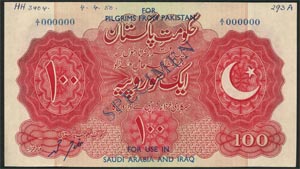Spink to Sell Pakistani Rarity

SPINK LONDON | Following on from our mammoth series of sales in April and an extremely successful return to Singapore this summer, Spink enters the Autumn season in high spirits with our September sale which contains a plethora of rarities and delights for our collectors to enjoy. The sale will take place on 29-30th September 2015 in the Spink London office.
With over 1500 lots comprising of a blend of archival material and collectors' treasures from around the world, this sale has something for everyone. Closer to home, we have a lovely collection of high quality Scottish notes sourced from many of the great names of the past, David Keable, James Douglas and others. You may also notice an eye-catching burst of colour leaping from Lot 1483, the vibrant Royal Bank of Scotland £100 (3 February 1966).
 |
An interesting feature of large format Scottish notes of this period is that they were issued with two vertical folds already in place, dividing the note into thirds. This means that it is impossible to find a truly uncirculated example, leading to an unofficial designation of "Scottish Uncirculated". This note falls into that category, which is exceptionally scarce with such a high denomination.
Lot 1483, estimated: £2,000 - 3,000
The star lot is a tremendously rare specimen of a Haj 100 rupee note from Pakistan, and a fascinating tale lies in its origin. In 1949 the pound sterling was devalued but the Pakistani authorities chose not to devalue its currency with the British standard. Aware that smugglers may take advantage of the subsequent speculation strong restrictions were placed on the import and export of Pakistani currency. The only exception to this was for currency taken to Saudi Arabia by Haj pilgrims who were permitted to take Pakistani currency to be exchanged for Saudi riyals and later returned to the Pakistani authorities by the Saudi Arabian banks. However, in the year following the pound's devaluation, it was noticed that considerably more currency than could possibly have been taken by the pilgrims was repatriated from Saudi Arabia. The restrictions put in place were being circumvented by smugglers taking Pakistani rupees to the Gulf States and having them returned via the legitimate channel of the Saudi Arabian banks.
How could the Pakistani government curb the smuggling and provide simple exchange facilities for Haj pilgrims? The answer came in the form of the Haj Pilgrim banknote, a special note designated only for use by pilgrims. The ordinance amending the State Bank Order to allow the Haj notes was made in May 1950 and the first issued note was the 100 rupee. While it shared the design of the existing 100 rupee note, it had two important distinctions: the colour was changed from green to a rich red underprint and then overprinted in blue with "FOR PILGRIMS FROM PAKISTAN FOR USE IN SAUDI ARABIA AND IRAQ". The Haj notes were not legal tender in Pakistan but they could be used in Saudi Arabia to purchase Saudi riyals and be remitted to Pakistan via the usual channel of the Saudi Arabian banks. The Haj note was an outstanding success for the government and proved popular with the pilgrims.
 |
Lot 725, estimated: £10,000 - 15,000
With our December sale to look forward to later in the year and 2016 building up already with some superb and varied collections in the pipeline, Spink has it covered for all things notaphily related so keep your eyes peeled in the coming months!
For more Information, please contact Andrew Pattison:
Tel: +44 (0)20 7563 4044| Email: [email protected]
About Spink
Spink is the world's leading auctioneer of stamps, coins, banknotes, medals, bonds & shares, autographs, books and wine. Since its foundation in 1666, the Spink name has become synonymous with tradition, experience and integrity. Holder of royal warrants and numerous records for prices achieved at auction, Spink offers an unparalleled range of services to collectors worldwide. Headquartered in London, with offices in New York, Hong Kong, Singapore and Switzerland, Spink holds over 70 auctions a year. Catalogues can be accessed through the Spink website (www.spink.com) or via the Spink App for iPhone and iPad.



